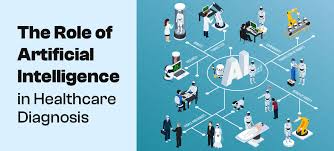Artificial Intelligence (AI) is revolutionizing the healthcare industry by enhancing medical diagnostics, personalized treatment plans, administrative processes, and patient care. This article explores the applications, benefits, challenges, and ethical considerations of AI in healthcare, highlighting its transformative impact on the industry.
Applications of AI in Healthcare
- Medical Imaging and Diagnostics: AI-powered algorithms analyze medical images (e.g., X-rays, CT scans, MRI) to assist radiologists in detecting abnormalities, diagnosing diseases (e.g., cancer, cardiovascular conditions), and improving diagnostic accuracy.
- Personalized Medicine: AI analyzes patient data, including genetic information, medical history, and lifestyle factors, to tailor personalized treatment plans and predict individual responses to medications, optimizing therapeutic outcomes.
Benefits of AI in Healthcare
- Improved Diagnostic Accuracy: AI algorithms enhance diagnostic precision by identifying subtle patterns and anomalies in medical images and patient data, reducing diagnostic errors and enabling early detection of diseases.
- Efficiency and Workflow Optimization: AI automates administrative tasks (e.g., appointment scheduling, medical billing), streamlines healthcare operations, and enhances healthcare delivery efficiency, allowing clinicians to focus more on patient care.
Challenges and Considerations
- Data Privacy and Security: Safeguarding patient data and ensuring compliance with privacy regulations (e.g., HIPAA, GDPR) is crucial when leveraging AI for healthcare applications, requiring robust data encryption and access controls.
- Ethical and Regulatory Issues: Addressing ethical concerns related to AI bias, transparency of algorithms, patient consent, and the ethical implications of AI-driven decision-making in healthcare settings.
Ethical Considerations in AI Healthcare
- Transparency: Ensuring transparency in AI algorithms and decision-making processes to enable healthcare professionals and patients to understand how AI recommendations are generated and interpreted.
- Equity and Accessibility: Mitigating biases in AI models to ensure fair treatment and equitable access to healthcare services across diverse patient populations, regardless of socioeconomic status or geographical location.
Future Directions and Innovations
- Predictive Analytics and Disease Prevention: AI-driven predictive models analyze large datasets to forecast disease outbreaks, identify high-risk patients for preventive interventions, and optimize public health strategies.
- Virtual Health Assistants and Remote Monitoring: AI-powered virtual health assistants, chatbots, and wearable devices monitor patient health remotely, provide real-time health advice, and support chronic disease management outside clinical settings.
Conclusion
Artificial Intelligence is revolutionizing healthcare by enhancing diagnostic accuracy, personalizing treatment plans, improving operational efficiency, and transforming patient care delivery. As AI continues to evolve, its integration into healthcare systems requires addressing challenges related to data privacy, ethical considerations, and regulatory compliance while maximizing its potential to improve health outcomes and healthcare access globally. By fostering collaboration among healthcare professionals, AI researchers, policymakers, and patients, the healthcare industry can harness AI’s capabilities to create a more efficient, equitable, and patient-centered healthcare ecosystem.
